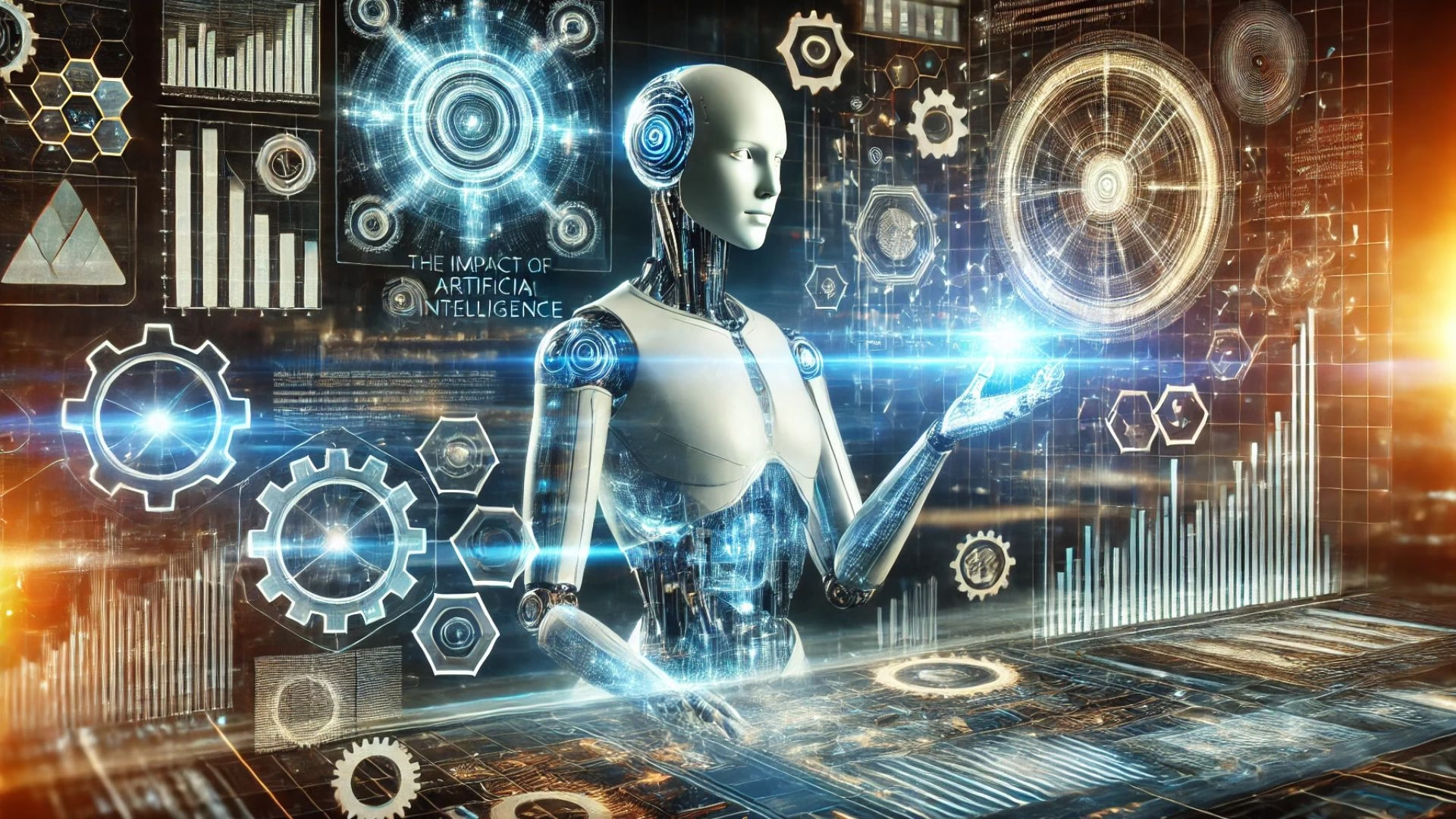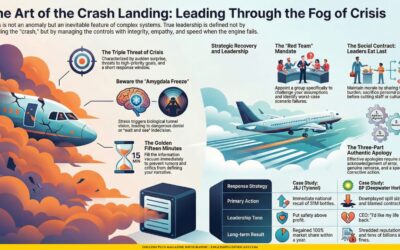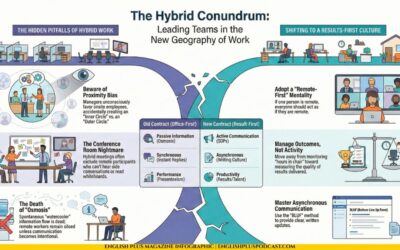- The Impact of Artificial Intelligence on Modern Business: Opportunities and Challenges
- The Role of AI in Business
- Opportunities AI Brings to Business
- Challenges and Ethical Considerations
- The Future of AI in Business
- Balancing Innovation with Responsibility
- Let’s Talk
- Let’s Learn Vocabulary in Context
- Let’s Discuss & Write
- Let’s Play & Learn
The Impact of Artificial Intelligence on Modern Business: Opportunities and Challenges
Artificial intelligence has shifted from science fiction to boardroom reality. Once a futuristic concept confined to the imaginations of visionary authors, AI is now a transformative force in the business world. From automating routine tasks to providing insights that would take humans months to uncover, AI is not just reshaping businesses—it’s redefining how we work, compete, and innovate. But while the opportunities are immense, so are the challenges. Let’s explore the multifaceted impact of artificial intelligence on business.
The Role of AI in Business
At its core, AI is about mimicking human intelligence to perform tasks like learning, problem-solving, and decision-making. In business, this translates to applications that can analyze massive datasets, predict market trends, and even interact with customers. AI doesn’t just make existing processes faster; it opens doors to entirely new ways of operating.
Take automation, for example. Tasks that were once repetitive and time-consuming—such as data entry, inventory management, or customer service inquiries—can now be handled by AI-powered systems. Chatbots like those powered by natural language processing (NLP) are handling customer interactions with speed and accuracy, often leaving customers wondering if they just chatted with a bot or a human.
AI also shines in data analysis. Businesses generate mountains of data daily, but extracting valuable insights from this information is a daunting task for humans. Enter AI tools that can identify patterns, predict outcomes, and recommend actions—all in real-time. Companies like Netflix use AI to suggest what you’ll binge next, while Amazon leverages it to recommend products you never knew you needed but suddenly can’t live without.
Opportunities AI Brings to Business
One of the most significant opportunities AI offers is enhanced decision-making. With predictive analytics, businesses can make informed decisions faster and with greater confidence. For instance, AI can forecast demand, optimize supply chains, and even predict equipment failures before they happen, saving companies millions in downtime.
AI also personalizes customer experiences like never before. By analyzing user behavior and preferences, AI creates tailored recommendations, marketing campaigns, and even product designs. This level of customization builds customer loyalty and drives sales.
Another game-changer is operational efficiency. AI streamlines processes, reduces errors, and increases productivity. Whether it’s through robotic process automation (RPA) or smart scheduling tools, AI allows businesses to do more with less, freeing up human talent for higher-value work.
Challenges and Ethical Considerations
Of course, AI isn’t all smooth algorithms and predictive bliss. Its rapid adoption has raised some serious challenges, particularly in ethics and workforce impact.
One major concern is the potential loss of jobs. As AI takes over routine tasks, many fear widespread unemployment, particularly in sectors reliant on manual or repetitive work. While AI creates new roles in areas like AI development and data science, the transition is not always seamless. Workers need reskilling, and businesses must invest in training programs to bridge the gap.
Ethical issues also loom large. Bias in AI systems is a significant concern. Since AI learns from data, it can unintentionally replicate the biases present in that data. This can lead to unfair outcomes in areas like hiring, lending, or law enforcement. Ensuring fairness and accountability in AI systems is a critical challenge for businesses adopting this technology.
Privacy is another hot-button issue. AI thrives on data, but collecting and analyzing personal information can cross ethical boundaries. Companies must navigate the fine line between personalization and intrusion, balancing business goals with consumer trust.
The Future of AI in Business
Looking ahead, the impact of artificial intelligence on business will only grow. AI is poised to revolutionize industries from healthcare to finance, offering new tools for diagnosis, fraud detection, and beyond. Businesses that embrace AI early and ethically will have a significant competitive advantage, but they must also remain agile as the technology evolves.
Collaboration between humans and AI will likely define the next phase of business innovation. Instead of replacing humans, AI will augment our capabilities, enabling us to work smarter, not harder. Imagine marketing teams using AI to draft copy, sales teams using it to identify leads, and HR teams using it to enhance employee engagement.
Balancing Innovation with Responsibility
The key to navigating AI’s impact lies in balance. Businesses must harness its power while addressing its risks. This means adopting transparent practices, investing in ethical AI, and fostering a culture of continuous learning. By prioritizing both innovation and responsibility, businesses can ensure AI serves as a force for good rather than a disruptor.
In the end, artificial intelligence isn’t just about technology—it’s about transformation. It’s changing how businesses operate, how employees work, and how customers interact with brands. The opportunities are vast, but so are the responsibilities. As businesses integrate AI, the question isn’t just what AI can do, but how we use it to create a future that’s not just efficient but equitable.
Let’s Talk
So, let’s dive deeper into this whole idea of AI in business. Isn’t it fascinating how artificial intelligence has gone from being this far-off sci-fi dream to something that decides what you’re having for dinner? Okay, maybe not quite, but those restaurant recommendations you see online feel eerily close. Have you ever stopped to wonder, though, how much of your daily life is already shaped by AI? And how much of it you’ve willingly handed over? I mean, how many times have you thought, “The algorithm knows me better than I know myself”?
Here’s the thing about AI—it’s not just helping businesses; it’s changing how we experience them. Think about customer service. Remember when talking to an actual human was the norm? Now, you’re probably interacting with chatbots half the time, and honestly, they’re getting good. But does that convenience come at a cost? Are we trading meaningful human interaction for faster, more efficient responses? And how long until AI knows when we’re frustrated and starts cracking jokes to calm us down?
Let’s talk about the workforce for a moment. Sure, AI is great for automating repetitive tasks, but what about the people whose jobs depend on those tasks? It’s easy to say, “Oh, they’ll just learn new skills.” But that’s easier said than done, right? Imagine you’ve been doing a job for years, and suddenly you’re told to pivot to data analysis or machine learning. It’s like being a chef and being told you’re now a food critic—it’s related, but not the same. So, how do businesses handle that transition without leaving people behind?
And let’s not forget ethics. The whole idea of AI being unbiased sounds great in theory, but in practice, it’s learning from data that humans created. So, if the data is biased, guess what? The AI is too. Do businesses have a moral obligation to ensure their AI systems are fair and transparent? Or will it always come down to profits versus principles?
Here’s a fun thought experiment: If AI gets smarter every day, will there come a time when it starts running businesses without us? Imagine a company where the CEO is a super-intelligent algorithm, making decisions based purely on data. Would that be a dream come true or a dystopian nightmare? Would it be efficient, or would we miss the creativity and intuition that only humans can bring?
At the end of the day, AI is a tool—a powerful one—but it’s only as good as the people using it. So, the real question is, how do we strike a balance? How do we harness its potential while staying grounded in what makes us human? Maybe the answer isn’t about AI taking over but about AI helping us become better at what we do. What do you think?
Let’s Learn Vocabulary in Context
Let’s break down some of the terms we’ve been tossing around and see how they show up in real life. These aren’t just tech buzzwords; they’re part of how we understand the world AI is shaping.
First up is “automation”. This is when machines or software take over tasks that humans used to do, like scanning your groceries or scheduling your meetings. You might say, “I’ve automated my email replies to save time,” which sounds efficient until you accidentally automate an embarrassing typo.
Then there’s “algorithm”, which is like a recipe a computer follows to solve a problem. For instance, social media algorithms decide what posts you see, often leaving you wondering why your feed is 90% cat videos.
“Data analysis” is all about making sense of information to find patterns or trends. Businesses use it to predict things like customer preferences. You could use it in real life by analyzing your spending habits and realizing most of your paycheck goes to coffee.
“Ethics” is about what’s right and wrong, especially when it comes to using AI responsibly. For example, asking, “Should we use AI to monitor employees?” is an ethical question, and the answer is probably, “Only if it’s done transparently.”
Let’s not forget “bias”, which happens when AI makes unfair decisions because it’s learned from flawed data. If an AI hiring tool keeps picking the same type of candidate, it might be worth asking, “Is this program biased?”
“Machine learning” is a type of AI that improves over time by learning from data. Think of it like teaching a dog tricks—except the dog gets smarter every day and eventually starts teaching you tricks.
Here’s “predictive analytics”, which sounds fancy but just means using data to guess what will happen next. Businesses use it to anticipate trends, and you might use it to predict which of your friends will cancel plans last-minute.
“Personalization” is tailoring experiences to individual preferences, like when Netflix suggests what to watch. It’s great when it works but creepy when it feels like Netflix knows your taste better than you do.
“Operational efficiency” is about doing things faster, cheaper, and better. It’s why companies love AI—it cuts costs while boosting output. You might call cleaning your house while ordering groceries online your version of operational efficiency.
Finally, “collaboration”. This is about humans and AI working together to achieve something amazing. Whether it’s creating art, solving problems, or simply making life easier, collaboration reminds us that AI isn’t here to replace us—it’s here to work with us.
Let’s Discuss & Write
- How do you feel about AI taking over customer service roles? Do you prefer the speed of chatbots or the empathy of a human conversation?
- Do you think AI can ever fully replace creativity in business decisions, or will there always be a need for human intuition?
- What ethical considerations do you think are most important for businesses using AI? How should they address them?
- How has AI already impacted your life, and do you think the changes have been mostly positive or negative?
- What steps should businesses take to ensure workers are not left behind as AI automates more jobs?
Writing Prompt:
Imagine a business ten years from now where AI plays a central role. Write a short piece describing how that business operates, the benefits it offers, and any challenges it faces.
Tips:
- Start by describing the type of business and how AI is integrated into its operations.
- Highlight the advantages, such as efficiency or innovation.
- Conclude with a reflection on any ethical or social challenges, like privacy or job displacement.










0 Comments